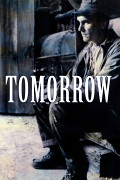
Directed by
Joseph Anthony
103 minutes
Rated PG
Reviewed by
Bernard Hemingway


Tomorrow
Based on a 1940 short story by William Faulkner adapted for the screen by Horton Foote, Tomorrow is grounded in the aesthetics of 1950s low budget social issue films such as Stanley Kramer’s The Defiant Ones (1958) or Sidney Lumet’s 12 Angry Men (1957) bu, remarkably for and American film, it also suggests Carl T. Dreyer sombre portraits of fundamentalist religious faith, in particular Day Of Wrath (1948)
Released the same year as his breakout film The Godfather, Robert Duvall here plays Stonewall Jackson Fentry, a taciturn Mississippi cotton farmer who marries a backwoods woman, Sarah (Olga Bellin), who turns up in an advanced state of pregnancy on his doorstep, on the run from her abusive husband. Sarah dies in childbirth and Fentry raises the child, (Buck), as his own, until some five years later when the husband’s redneck family claims him. The boy grows up a wrong 'un and is in his early twenties when he is shot dead by a Mr Bookwright who catches Buck in the act of running off with his daughter. The film opens with a strikingly stylized depiction of the shooting then cuts to Bookwright’s trial, on the jury of which Fentry happens to be. The film then scrolls back twenty years to tell Fentry’s story with the help of intermittent narration.
Director Joseph Anthony was mainly known as a successful theatre director whilst Foote’s script was originally a stage play and a theatrical perspective is evident in the film's lean staging. Nevertheless a good deal of attention has been paid to making the film look authentic. It was filmed in Tupelo, Mississippi and surrounding areas (standing in for Faulkner’s fictional Yoknapatawpha County), with Anthony and cinematographer Alan Green being influenced by Walker Evans’s famous black and white photographs of rural poverty in the South during the Depression and using locals for the majority of the roles. Dramatically, however, the film is stripped down to its essentials, making it largely a two-hander.
Centre-stage is Duvall's Fentry, a reticent but gentle man eking out a living by caretaking a sawmill over winter. When the woman appears in his lonely life he strongly bonds to her as a fellow outcast. Duvall and Bellin had played the parts in a small stage production of Foote’s play in 1968 and the interplay between the two is faultless with Anthony never pushing for effect but staying true to the couple’s unquestioning acceptance of their lot in life, and, as the closing narration states and the title alludes to, their willingness to endure for life itself.
FYI: Tomorrow was the second time that Duvall appeared in a Foote script, playing Boo Radley in 1962’s To Kill a Mockingbird. Their third collaboration, 1983’s Tender Mercies, earned them both Oscars.
Want something different?





